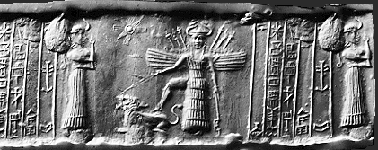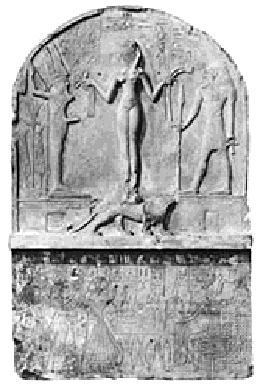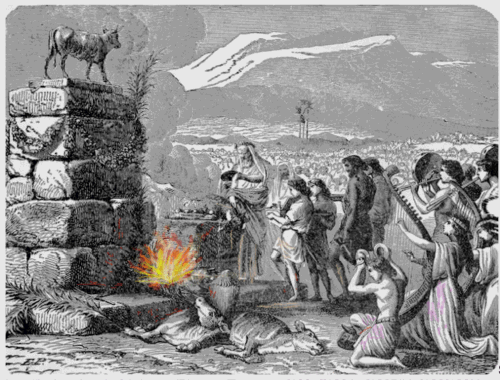Musical Instruments
2
Chronicles 34:13Also they were over the bearers of
burdens, and were overseers of all that wrought the work
in any manner of service: and of the Levites there were scribes,
and officers, and porters.
Psa 71
22 I will also praise thee
with the psaltery,
even
thy truth, O my God: unto thee
will I sing with the
harp,
O thou Holy One of Israel.
23 My lips shall greatly rejoice when I sing
unto thee; and my soul, which thou hast redeemed.
24 My tongue also shall talk of thy
righteousness all the day long: for they are confounded,
for they are brought unto shame, that seek my hurt.
That
chant to the sound of the viol, and invent to themselves instruments of
musick, like David; Am.6:5
I
nstruments of the Indignation of
Jehovah.
Isaiah 13:[4] The noise of a multitude
in the mountains, as of a great people! the noise of a
tumult of the kingdoms of the nations gathered together!
Yahweh of Hosts is mustering the host for the battle.
sŏno , I. Neutr.,
to make a noise, to sound, resound:
aes sonit, the trumpet sounds
Isa 13:5 They come from a far country, from the end of
heaven, even the Lord, and the weapons of his
indignation, to destroy the whole land.
The Lord hath opened his
armoury, and hath brought forth the
weapons of his indignation:
for this is the work of the Lord God of hosts in the
land of the Chaldeans. Jeremiah 50:25
The vile person shall be no more called liberal, nor the churl said to be
bountiful. Isa 32:5
A VILE PERSON IS LIKE
THE WINESKIN OF THE WITCH OF ENDOR OR THE SOUNDING BRASS
OF 1 COR. 13.
Is.
32:4 The heart also of the rash shall understand
knowledge, and the tongue of the stammerers shall be ready
to speak plainly.
Is. 32:5 The vile person shall be no more called liberal,
nor the churl said to be bountiful.
Is. 32:6 For the vile person will speak villany, and his
heart will work iniquity, to practise hypocrisy, and to
utter error against the LORD, to make empty the soul of
the hungry, and he will cause the drink of the thirsty to
fail.
Is. 32:7 The instruments also of the churl are evil: he
deviseth wicked devices to destroy the poor with lying
words, even when the needy speaketh right.
Nabal (h5036) naw-bawl'; from
5034; stupid; wicked (espec. impious): - fool (-ish, -ish
man, -ish woman), vile person.
Nabel (h5034) to wilt; gen. to fall away, fail, faint; fig. to be foolish... make vile, wither..
Nebel (h5035) from 5034; a skin- bag for
liquids (from collapsing when empty); hence a vase
(as similar in shape when full); also a lyre (as having a body of like
form): - bottle, pitcher, psaltery, vessel, viol
For the vile person will speak villany, and his heart will work
iniquity, to practise
hypocrisy,
and to utter
error against the Lord,
to make
empty the soul of the hungry,
and he will cause the drink of the thirsty to fail. Isaiah 32:6
The instruments also of the churl are evil: he deviseth wicked devices to destroy the poor with lying words, even when the needy
speaketh right. Isa 32:7
And the Lord said unto
me, Take unto thee yet the instruments of a foolish (vile) shepherd. Zech 11:15
Instruments (h3627) kel-ee'; from
3615; something prepared, i. e. any apparatus (as an
implement, utensil, dress, vessel or weapon): - armour
([-bearee]), artillery, bag, carriage, / furnish,
furniture, instrument, jewel, that is made of, one from
another, that which pertaineth, pot, / psaltery, sack, stuff, thing, tool,
vessel, ware, weapon, / whatsoever.
Jer. 50:24 I have laid a
snare for thee, and thou art also taken,
O Babylon, and thou
wast not aware:
thou art found, and
also caught,
because thou hast
striven against the LORD.
Jer. 50:25 The LORD hath opened his armoury,
and hath brought forth
the weapons of his indignation:
for this is the work
of the Lord GOD of hosts in the land of the Chaldeans.
The meaning of the
Levites as Bellor fight, carry on war,
-Verg. A. 11.660 The maids of Thrace
ride thus along Thermodon's frozen flood,
and fight with blazoned Amazonian arms
around Hippolyta; or when returns
Penthesilea in triumphal car
'mid acclamations shrill, and all her host
of women clash in air the moon-shaped shield.
-Note
[662] Se refert, victorious
from the battle. So Claud. l. c. quoties Arcton populata virago Hippolyte niveas ducit post proelia turmas. Ululante tumultu: tumultus ipse ululat cum ululent tumultuantes, Gossrau. The verb
is appropriate here, both as indicating triumph (the Greek ὀλολύζειν) and as characteristic
of women. Magno turbante tumultu 6. 857.
-Ululo (Halal) Howl, make to
ring, resound,
A. Lit.: canis ululat acute, Enn. ap. Fest. s. v. nictare, p. 177 Mόll. (Ann. v. 346 Vahl. : canes, Verg. A. 6, 257;
Ov. M. 15, 797
lupi, Verg. G. 1, 486;
cf. id. A. 7, 18:
simulacra ferarum. Ov. M. 4, 404:
summoque ulularunt vertice Nymphae, Verg. A. 4, 168;
Cat. 63, 28;
Hor. S. 1, 8, 25:
Tisiphone thalamis ululavit in illis, Ov. H. 2, 117:
per vias ululasse animas, id.
F. 2, 553; id. M. 3, 725;
9, 642; Luc. 6, 261 al.;
cf.: ululanti voce canere, Cic.
Or. 8, 27.
-cănis (cănes , Plaut. Men. 5, 1, 18;
id. Trin. 1, 2, 133;
1, 2, 135; Enn. ap. Varr. L. L. 7, § 32 Mόll., or Ann.
v. 518 Vahl.; Lucil. ap. Varr. ib.; cf. Charis.
1, 17, p. 118 P.; abl. always cane;
Ov. H. 5, 20:
canibus circumdare saltus, Verg. E. 10, 57:
hos non inmissis canibus agitant, id. G. 3, 371:
leporem canibus venari, id.
ib. 3, 410.
1. As a term of
reproach, to denote,
a. A
shameless,
vile person,
Plaut. Most. 1, 1, 40;
Ter. Eun. 4, 7, 33
Donat. ad loc.;
Hor. Epod. 6, 1;
cf.
id. S. 2, 2, 56;
Petr. 74, 9;
Suet. Vesp. 13.
D. A Cynic philosopher:
Diogenes cum choro canum suorum,
Lact. Epit. 39, 4.
B. Transf., of places, to ring, resound,
re-echo with howling: penitusque cavae plangoribus aedes Femineis ululant, Verg. A. 2, 488:
resonae ripae, Sil.
6, 285: Dindyma sanguineis Gallis, Claud.
Rapt. Pros. 2, 269.
-Gallus A. Galli , ōrum, m., the
priests of Cybele, so called because of
their raving, Ov. F. 4, 361 sq.;
Plin. 5, 32, 42, § 146;
11, 49, 109, § 261;
35, 12, 46, § 165;
Paul. ex Fest. p. 95 Mόll.;
Hor. S. 1, 2, 121.In
sing.: Gallus , i, m., a
priest of Cybele, Mart.
3, 81; 11, 74;
cf. Quint. 7, 9, 2:
resupinati cessantia tympana Galli, Juv. 8, 176.And
satirically (on account of their emasculated
condition), in the fem.: Gallae , ārum, Cat. 63, 12,
and 34.
2. (Acc. to II. A., of or belonging to the priests
of Cybele; hence, transf.) Of or belonging to
the priests of Isis, Gallic: turma, the troop of
the priests of Isis, Ov. Am. 2, 13, 18.
II. Act., to cry or howl
out to any one; to howl forth, utter with
howlings, cry out; to wail or howl over
any thing; to fill a place with howling, with
yells or shrieks quem
sectus
ululat
Gallus,
Mart. 5, 41, 3: nocturnisque
Hecate
triviis
ululata
per
urbem,
Verg. A. 4, 609: ululata
Lucina,
Stat. Th. 3, 158:
Is. 42:1 Behold my servant, whom I uphold; mine elect, in whom
my soul delighteth;
I have put MY
spirit upon him:
he shall bring forth
judgment to the Gentiles.
Pud Dedo litteras
alicui,
said
of
the
writer,
to give one a letter to deliver, id.
ib. 5, 15 fin.; of
the
bearer
Sane
facultatem
ad
explicandas
tuas
litteras
DO in the granting of judges, actions,
exceptions, etc.; DICO in pronouncing sentence of judgment;
ADDICO in adjudging the property in dispute to one or the
other party; cf. Varr. L. L. 6, § 30
Mόll.; hence
called
tria
verba,
Ov. F. 1, 47.
accipiet personam
Accipiet to take
a person or thing to one's self, will take
the man and his money to himself , to take, to
take possession WILL NOT carmen
auribus,
Persōna
mask, esp. that used by players, which
covered the whole head, and was varied according to the
different characters to be represented. The masks were
usually made of clay. ut tragicus cantor ligno tegit ora
cavato, Prud. adv Symm. 2, 646.
personage, character, part,
represented by an actor:
parasiti
persona
personā
poλtae
I. In
gen., a maker, producer (ante-class.):
nec
fallaciam
Astutiorem
ullus
fecit
poλta,
a contriver, trickster, Plaut. Cas. 5, 1, 7:2.A
versificator
human being who performs any function, plays any part,
a person, personage:
Is. 42:2 He shall not cry, nor lift up, nor cause his voice to
be heard in the street.
Ad Isidem, ut parientem Corinnam iuvet
While rashly her wombes burthen she casts out,
Wearie Corinna hath her life in doubt.
She secretly with me such harme attempted,
Angry I was, but feare my wrath exempted.
But she conceiv'd of me, or I amsure
I oft have done, what might as much procure.
Thou that frequents Canopus pleasant fields,
Memphis, and Pharos that sweete
date trees yeelds,
And where swift Nile in his large channell
slipping,
By seaven huge mouthes into the sea is skipping,
By fear'd Anubis visage I thee pray,
So in thy Temples shall Osiris stay,
And the dull snake about thy offrings creepe,
And in thy pompe hornd Apis with thee keepe,
Turne thy lookes hether, and in one spare twaine,
Thou givest my mistris life, she mine againe.
Shee oft hath serv'd thee upon certaine dayes,
Where the French rout engirt themselves with
Bayes.
On labouring women thou doest pitty take,
Whose bodies with their heavy burthens ake.
My wench, Lucina, I intreat thee favour,
Worthy she is, thou shouldst in mercy save her.
In white, with incense Ile thine Altars greete,
My selfe will bring vowed gifts before thy feete,
Subscribing, Naso with Corinna
sav'd:
Do but deserve gifts with this title grav'd.
But if in so great feare I may advize thee,
To have this skirmish fought, let it suffice thee.
Turma , aII.
Transf., in gen., a troop, crowd, throng,
band, body: in turmā inauratarum equestrium (statuarum), Cic. Att. 6, 1, 17:
immanis Titanum, Hor. C. 3, 4, 43:
Iliae, id.
C. S. 38: cristatae exercitus. Claud. III. Cons. Hon. 133; id. in Ruf. 2, 343: Alexan dri, Plin. 34, 8, 19, § 64:
feminea, Ov. P. 4, 10, 51: Gallica, i. e. of
priests of Isis, id. Am. 2, 13, 18.
fēmĭnĕus , a, um,
adj. id.,
I. of
or
belonging to a woman,
womanly,
feminine
(rare but class. and mostly
poet.) =
muliebris.
II. Transf., with an accessory notion
of contempt,
womanish,
effeminate,
unmanly:
vox, Quint, 1, 11, 1; cf.
Ov. A. A. 3, 286:
pectus,
Ov. M. 13, 693:
amor praedae,
Verg. A. 11, 782:
lunae femineum et molle sidus,
Plin. 2, 101, 104,
§ 223.
Tumultus of thunder, a sudden
or impending war, civil war, insurrection, pertubatio
2.
Of an orator or an oration, diffuse, prolix:
fiunt pro grandibus tumidi ... laetis corrupti, compositis exsultantes,

THE HOLY PROSTITUTE IN
EGYPT: DOMINATING THE TRUE LION
In Egypt, a goddess
named Qedeshu, Lady of Kadesh (Syria), was worshiped in
the 19th and 20th dynasties (1292 c. 1075 BC). Her
representation is found on private stelae of middle-class
workers. She is shown nude, posed frontally on a lioness
(or a leopard), holding arrows in her hands. Although
Israelite prophets and reformers repeatedly denounced sacred prostitution, the early Israelites seem to have adopted the
local Canaanite rites, which they apparently practiced
publicly until the reform of King Josiah about 621 BC.
Britannica

Hathor as Qadesh the Syrian
fertility goddess with phallic Min. Note the Hathor crown and
headdress. She
stands on a lion, holding a serpent and ears of grain (Graves
1946, Pritchard 1954)
And I
wept much, because no man was found worthy to open and to
read the book, neither to look thereon. Revelation 5:4
And one of the elders
saith unto me, Weep not: behold, the Lion of the tribe of Juda, the
Root of David, hath prevailed to open th

<img
src="https://hitwebcounter.com/counter/counter.php?page=7793698&style=0032&nbdigits=5&type=ip&initCount=0"
title="Free Counter" Alt="web counter" border="0"
/></a>
12.28.23. 60




